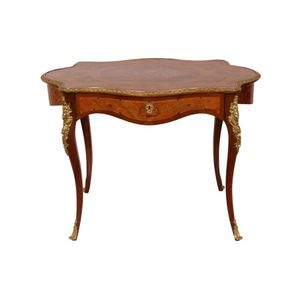Napoleon III Boulle Centre Table with Distressed Finish
You must be a subscriber, and be logged in to view price and dealer details.
Subscribe Now to view actual auction price for this item
When you subscribe, you have the option of setting the currency in which to display prices to $Au, $US, $NZ or Stg.
- Boulle - Boulle work is the name given to tortoiseshell and metal inlay using brass and sometimes silver, found on furniture and smaller wooden objects. It originated in Italy but was developed by Frenchman Andre Charles Boulle (1642 - 1732) under Louis XIV.
Boulle was appointed Royal Cainet Maker to Louis XIV and designed furniture and clockcases for the monarch.
In preparation, the tortoiseshell and metal were cut together following a design, using a fine fret saw.
In the application of the Boulle, the carcase of piece of furniture was covered with the tortoiseshell which in turn was inlaid with the matched designs in metal, which in turn was elaborately engraved.
The use of Boulle work furniture continued mainly in France until the 19th century. - Cabriole Leg - The cabriole leg evolved from an elongated scroll, curving out at the knee which may or may not be carved, and forming a serpentine shape as it descends to the foot.
First introduced into English furniture in the late 17th century, cabriole legs were widely used during the Queen Anne and early Georgian periods, where they frequently terminated in a pad foot or ball and claw foot. The style has had many imitators since then. The cabriole leg was re-introduced in the mid-19th century, and is commonly associated with the balloon-back dining or drawing-room chairs made in walnut, mahogany or, in Australia, cedar. The Victorian cabriole leg, on the whole, was rather more slender than the earlier form, following the French style, which emphasized the delicacy and daintiness of the chairs they were designed to support. Cabriole legs are sometimes found on windsor chairs, especially those made during the 18th century. - Serpentine - Resembling a serpent, in the form of an elongated 'S'. A serpentine front is similar to a bow front, except that the curve is shallow at each end, swelling towards the middle. The term presumably derives from its similarity to a moving snake or serpent. Serpentine fronts are usually veneered, with the carcase either being cut and shaped from a solid piece of timber, or built in the 'brick' method.
- Distressed - Usually applied to describe the condition of an item of furniture, and means that the object is extremely worn and is verging on being unsuitable for its intended use, without some restoration or repairs being undertaken.
Furniture can also be artificially distressed, by deliberate infliction of superficial damage to make it appear old. Artificial distressing can be done with the object of deceiving a purchaser, where the object is being passed off as "of the period", or can be done for aesthetic reasons so that a new object is made to appear as though it has been in use.
This item has been included into following indexes:
Visually similar items

French parlour table, late 19th century walnut with brass banding and mounts kingwood and satinwood inlaid decorations

A French Louis XV style floral marquetry inlaid ladies poudreuse. The hinged top concealing a mirror on cabriole legs, with ormolu sabots. 72 cm high, 89 cm wide, 45 cm deep

A French flame mahogany and marquetry writing table, 19th century the shaped red leather inset top with fine floral marquetry inlay above a figured scalloped mahogany frieze, with fine gilt bronze mounts throughout, on slender cabriole legs 75 x 86 x 85 cm

French Louis XV style walnut lamp table, circular form with a marble top, above a carved frieze on cabriole legs. 65 cm high, 78 cm wide.
